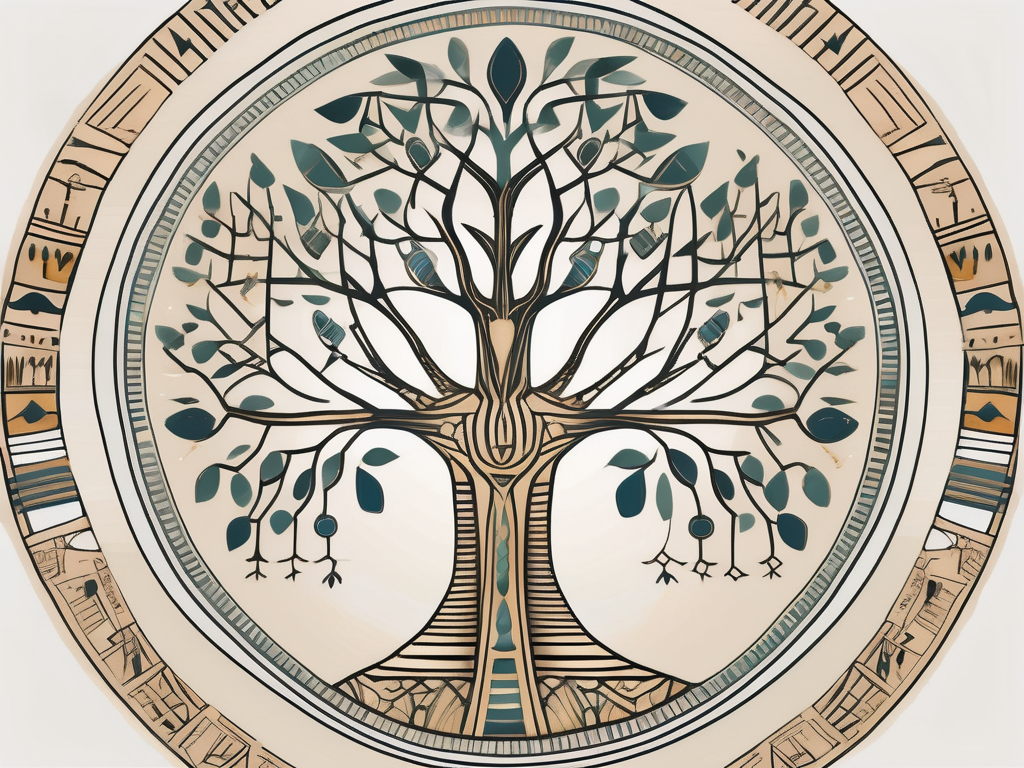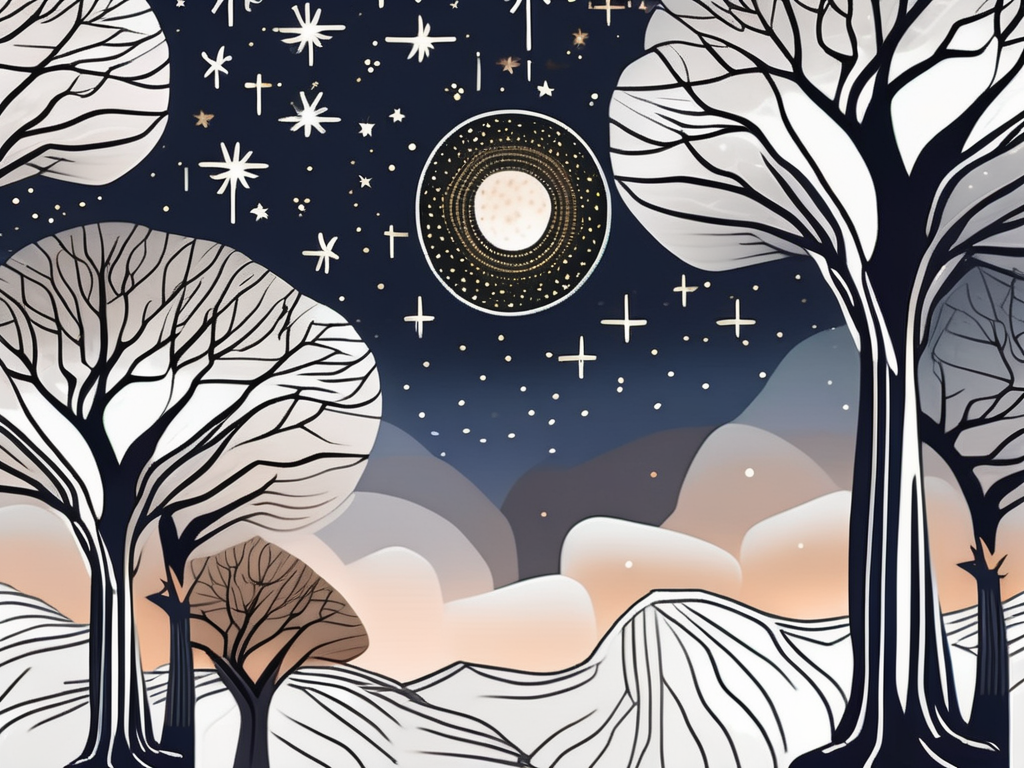Welcome to a fascinating journey through the intricate web of Egyptian mythology. In this article, we will delve into the ancient Egyptian concept of divinity and explore the role and lineages of the gods that shaped their rich civilization. Prepare to unlock the secrets of the Egyptian Gods family tree.
Understanding the Concept of Divinity in Ancient Egypt
Ancient Egyptians believed that gods played a crucial role in their everyday lives. They worshiped a pantheon of deities, each associated with different aspects of life, nature, and the afterlife. The gods were seen as both divine and mortal, possessing human-like qualities while also having supernatural power.
These gods were considered intermediaries between humans and the unseen world. They were believed to govern the forces of nature, provide protection, bless the fertile Nile floods, and even control life and death.
Ancient Egyptians had a deep reverence for their gods, and their religious practices were intricately woven into the fabric of their society. The gods were not distant entities to be feared or revered; rather, they were intimately intertwined with every aspect of life. The Egyptians believed that the gods were protectors of the pharaoh and the kingdom, ensuring prosperity and harmony.
People would make offerings, build temples, and hold rituals to seek guidance, protection, and favor from the gods. These rituals were not mere formalities; they were heartfelt expressions of devotion and gratitude. The Egyptians believed that by honoring the gods, they could maintain a harmonious relationship with the divine and ensure the well-being of their society.
The belief in the afterlife was deeply rooted in Egyptian society, and the gods played a vital role in guiding souls to the realm of the dead. They were believed to be the guardians of the deceased, guiding them through the perilous journey to the afterlife. The Egyptians believed that the gods would judge the souls based on their actions in life, determining their fate in the afterlife.
The Different Types of Gods in Ancient Egypt
The Egyptian pantheon consisted of diverse gods, each fulfilling unique roles. The gods were categorized into various groups based on their functions, origins, and associations.
First, there were the creation gods, responsible for the birth of the world and its inhabitants. These gods were believed to have shaped the universe and brought life into existence. They were revered as the ultimate creators, the architects of the cosmos.
Next, there were the sun gods, who held immense power and symbolized vitality and renewal. The sun was a central element in Egyptian mythology, representing life, light, and warmth. The sun gods were seen as the source of all life, providing energy and sustenance to the world.
Lastly, there were the Osirian gods, centered around the myth of Osiris, ruler of the afterlife and judge of the deceased. Osiris was believed to have been the first pharaoh and the one who introduced civilization to Egypt. He was also associated with fertility, agriculture, and the annual flooding of the Nile, which brought fertility to the land.
These are just a few examples of the diverse gods worshiped by the ancient Egyptians. Each god had their own unique attributes, stories, and rituals associated with them. The gods were not only revered for their power and influence but also loved and respected for their role in maintaining the order and balance of the universe.
The Structure of the Egyptian Gods Family Tree
The Creation Gods: The First Generation
The Egyptian creation myth was a complex narrative, involving gods and goddesses who brought the world into existence. Among the prominent creation gods were Atum, who emerged from primordial chaos, and Ptah, the skilled craftsman responsible for designing the physical forms of the world.
Atum, the self-created god, was believed to have risen from the waters of chaos and brought order to the universe. He was often depicted as a man wearing the double crown of Upper and Lower Egypt, symbolizing his dominion over the entire land. Ptah, on the other hand, was revered as the master architect who used his creative powers to shape the world according to his divine vision.
These gods and goddesses set the stage for the subsequent generations of deities, paving the way for the sun gods and Osirian gods to emerge.
The Sun Gods: The Second Generation
The sun gods held great significance in Egyptian mythology, representing light, warmth, and life. Chief among them was Ra, the sun god responsible for the solar cycle and seen as the creator of the world. Ra was often depicted with a sun disk on his head, radiating divine energy.
Ra, the mighty sun god, was believed to travel across the sky during the day and journey through the underworld at night, symbolizing the eternal cycle of life and death. His journey was accompanied by various solar deities, such as Khepri, the scarab beetle god who pushed the sun disk across the sky at dawn, and Atum, who merged with Ra during his nocturnal journey through the underworld.
Other notable sun gods included Horus, the falcon-headed god associated with the pharaoh and divine kingship. Horus was believed to be the son of Osiris and Isis, and his role as a sun god emphasized his connection to the pharaoh’s power and authority. Amun-Ra, a powerful fusion of Amun, the hidden god, and Ra, represented the union of the divine forces of creation and the sun.
The Osirian Gods: The Third Generation
The Osirian gods centered around the myth of Osiris, the god of the underworld and ruler of the afterlife. Osiris was believed to have been murdered by his brother, Seth, and later resurrected by his sister-wife, Isis. This myth became a symbol of resurrection and eternal life for the ancient Egyptians.
Osiris, the wise and just ruler of the afterlife, was often depicted as a mummified pharaoh, symbolizing his role as the judge of the deceased. His wife, Isis, was a powerful goddess of magic and fertility, known for her unwavering devotion to Osiris and her role in resurrecting him. Together, they represented the eternal cycle of life, death, and rebirth.
Other Osirian gods included Horus, the son of Osiris and Isis who avenged his father’s death and became the patron deity of pharaohs. Horus was often depicted as a falcon or as a man with the head of a falcon, symbolizing his connection to the sky and his role as a protector of the pharaoh’s power and legitimacy.
The Major Gods and Their Lineages
The Lineage of Ra: The Sun God
Ra, the sun god, was considered the ruler of the gods and the pharaohs alike. His family tree was intertwined with numerous other gods and goddesses, reflecting the complex nature of Egyptian mythology.
Among Ra’s divine lineage were his children Shu, the god of air, and Tefnut, the goddess of moisture. From their union, the gods Geb, the earth, and Nut, the sky, were born.
The Lineage of Osiris: The God of the Underworld
The Osiris family tree was marked by tragic events and divine salvation. Osiris and Isis were siblings who married and conceived the falcon-headed god Horus. Set, Osiris’ jealous brother, murdered him, but thanks to Isis’ magic, Osiris was resurrected and became the ruler of the underworld.
Through Osiris and Isis, many other gods and goddesses were born, such as Anubis, the god of embalming, and Hathor, the goddess of love and joy.
The Lineage of Isis: The Goddess of Magic
Isis, the powerful goddess of magic, had a lineage that intertwined with both the sun gods and the Osirian gods. She was the daughter of Ra and the sister-wife of Osiris. Their union produced their son, Horus, who went on to become a major deity in Egyptian mythology.
Isis’ association with magic and her dedication to protecting Horus and avenging Osiris’ death made her one of the most revered goddesses in ancient Egypt.
The Lesser Known Gods and Their Roles
The Role and Lineage of Anubis: The God of Embalming
Anubis, the jackal-headed god, played a crucial role in the Egyptian funerary process. He was believed to guide the souls of the deceased and oversee the embalming and mummification rituals.
Anubis was considered the son of Osiris and Nephthys, another prominent goddess in the Egyptian pantheon. His presence ensured the proper preservation and protection of the deceased on their journey to the afterlife.
The Role and Lineage of Thoth: The God of Wisdom
Thoth, the ibis-headed god, was revered as the god of wisdom, writing, and knowledge. He played a vital role in Egyptian religious texts, acting as the scribe of the gods and the record-keeper of the pharaoh’s deeds.
Thoth’s lineage was connected to both Ra and Osiris. He was believed to be the son of Ra and the brother of Horus and Set. His wisdom and magical abilities made him highly respected by both gods and humans.
The Influence of the Egyptian Gods Family Tree on Modern Culture
The Egyptian Gods in Modern Literature and Film
Ancient Egyptian mythology continues to captivate the imagination of people across the globe, and it has served as a rich source of inspiration for countless works of literature and film. From bestselling novels to blockbuster movies, the gods and goddesses of ancient Egypt have brought their timeless stories to life.
Relics of this influence can be found in popular franchises like “The Mummy” and “Gods of Egypt,” where the gods interact with mortals and embark on epic adventures, showcasing the enduring appeal of these mythological figures.
The Egyptian Gods in Contemporary Religious Practices
Although ancient Egyptian religious practices have faded away, their influence can still be felt today. Modern spiritual movements, such as Kemeticism, seek to revive and reconnect with the ancient Egyptian gods, incorporating their worship and rituals into contemporary religious practices.
Additionally, the iconography and symbolism of Egyptian gods can be found in various esoteric traditions, inspiring personal spiritual journeys and offering a connection to the divine realms.
In conclusion, the Egyptian Gods family tree is a complex tapestry of divine lineages, representing the diverse roles and influences of the gods in ancient Egyptian society. Their myths and legends continue to captivate our imaginations and shape our understanding of the ancient world. By unraveling these ancient lineages, we gain insight into the beliefs, values, and aspirations of one of the most remarkable civilizations in history.












